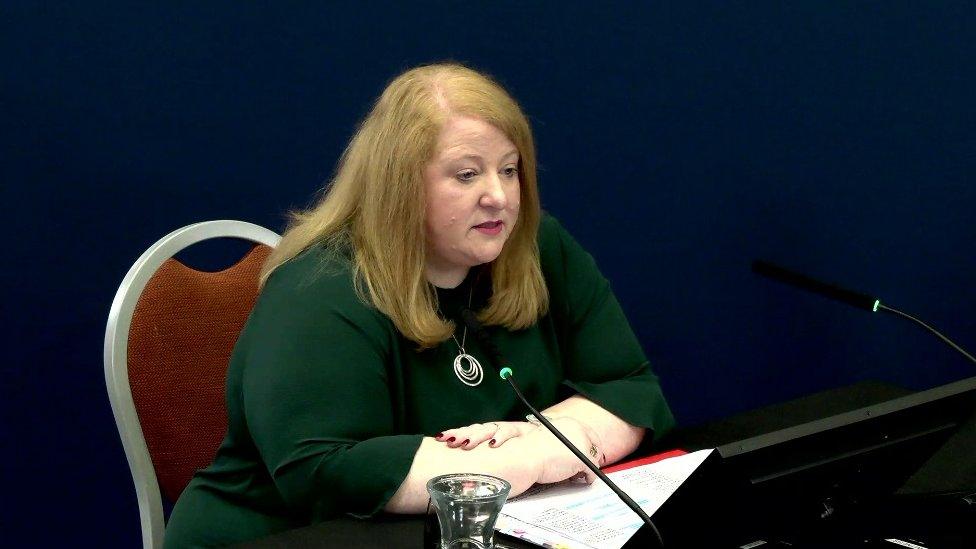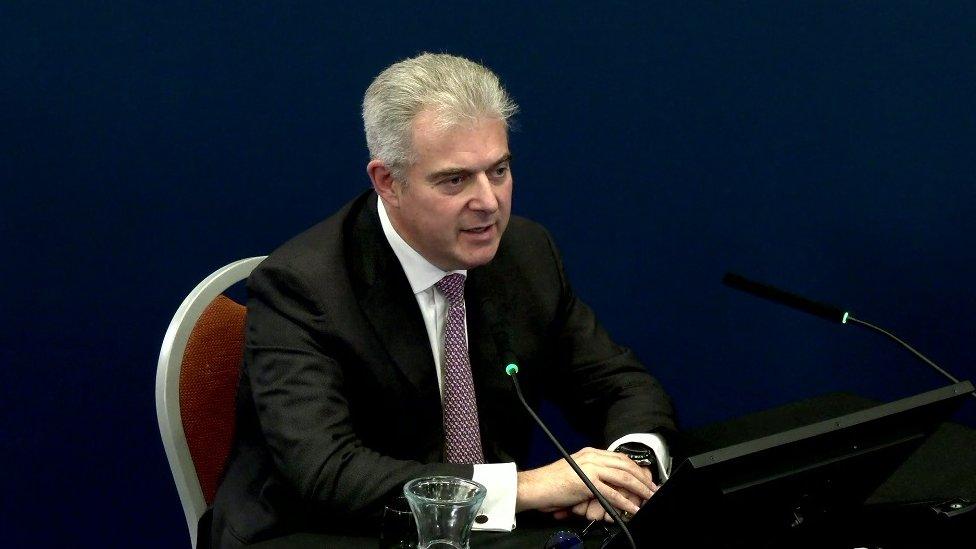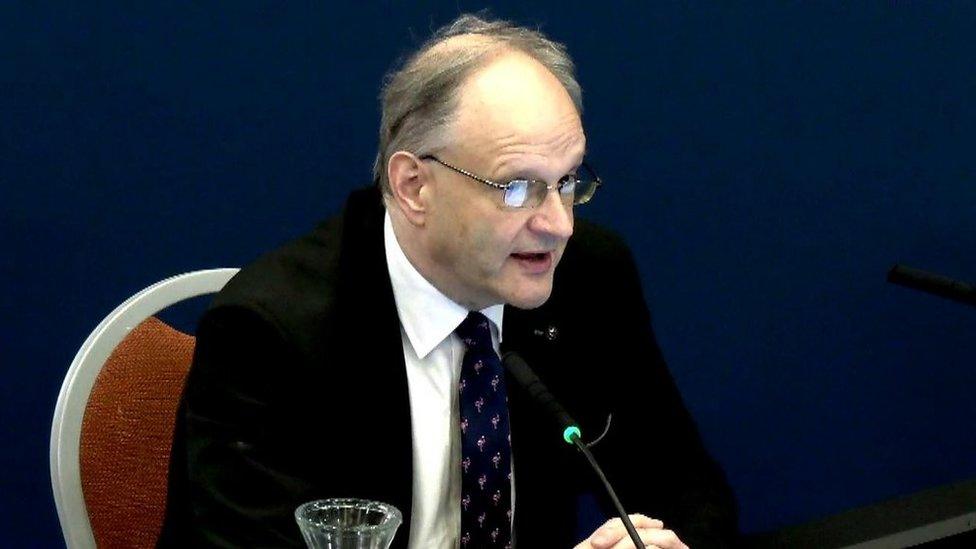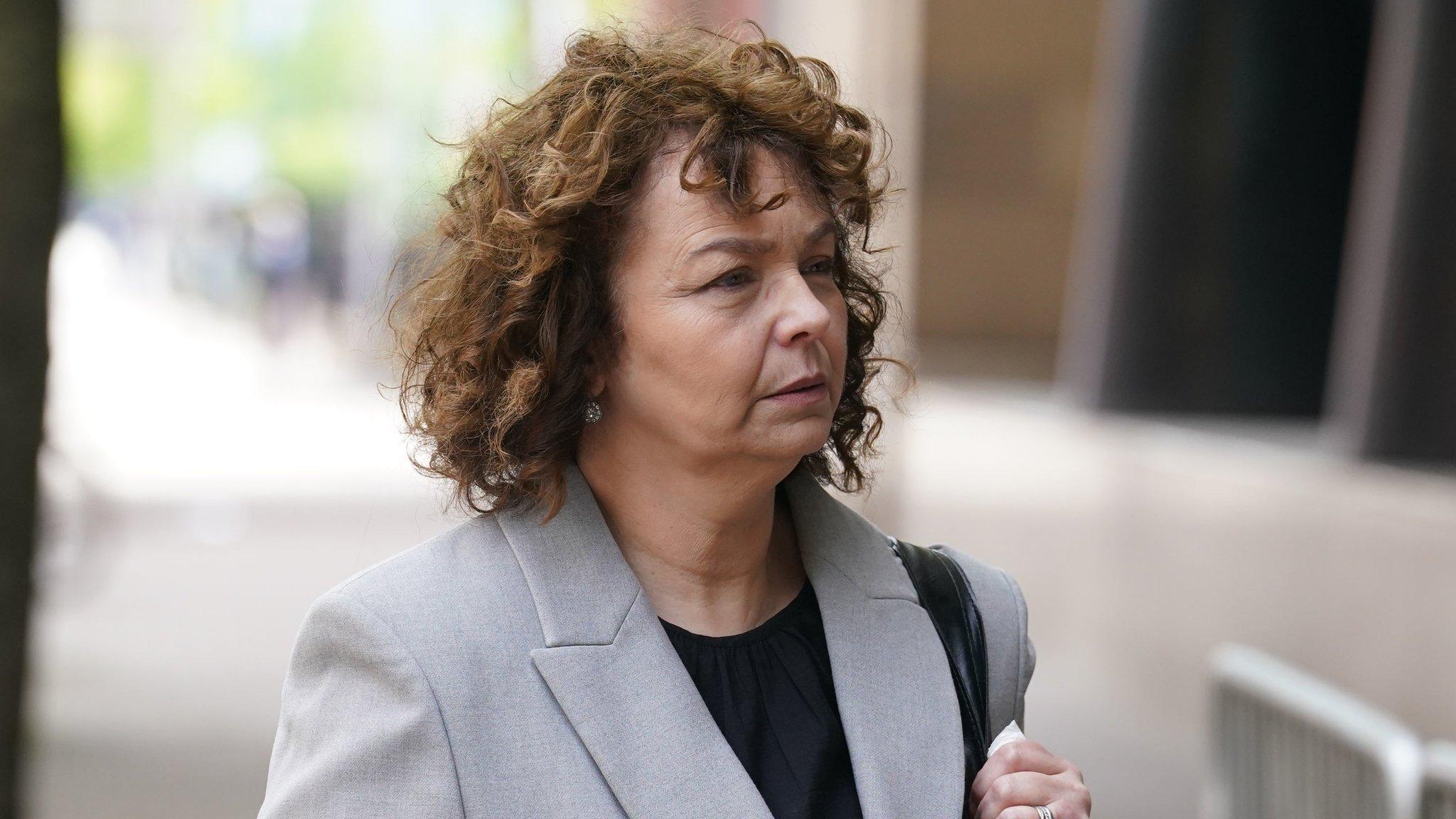Covid Inquiry: DUP's Poots emotional recalling father's death
- Published
Edwin Poots became emotional as he gave evidence at the Covid-19 inquiry
Stormont Speaker Edwin Poots became emotional at the Covid Inquiry as he recalled the death of his father in the early days of the pandemic.
During the public health response, Mr Poots served as agriculture minister.
Giving evidence on Thursday, Mr Poots was tearful as he described how he was unable to see his father in the final days of his life because of the Covid restrictions.
Charlie Poots died at the age of 90 in April 2020.
During his evidence he also claimed that leaks from the Executive came from the Department of Health as it had all the relevant information.
Veto was 'action of last resort'
Edwin Poots also defended his decision to use a veto to block the Executive from extending Covid-19 restrictions.
Health Minister Robin Swann had sought the extension in November 2020 following concerns about rising infection rates.
But Mr Poots called for a cross community vote which blocked the move. The Executive eventually agreed a compromise.
Mr Poots said it was an "action of last resort" as his fellow ministers were not willing to work together to find an agreed solution.
The former agriculture minister also raised concern about the level of missed cancer diagnosis during the pandemic.
He said up to 170 cancer screening were cancelled during that time along with 4,000 heart screenings.
"We should have been following the science which said we needed to prevent cancer but instead we closed down all the clinics which was unnecessary," he said.
Questioned about controversial tweets he posted raising concerns about Executive decisions, he said they were out of "frustration" and he wanted to put forward an alternative viewpoint.
Mr Poots also criticised Sinn Féin ministers for attending the funeral of republican Bobby Storey, which he said had "diminished their roles".
But he added he recognised the apology on Wednesday from former Sinn Féin Minister Carál Ní Chuilín over her attendance at the funeral.
"I commend her for making that apology," he said.

Justice Minister Naomi Long was speaking about the leaking which went on in the executive
Justice Minister Naomi Long also raised concerns about leaks during her evidence to the inquiry on Thursday.
She said leaks from Stormont Executive meetings created a sense of "panic" and made ministers appear "incompetent".
She also accused Sinn Féin ministers of undermining "confidence in medical advice" by pushing for schools to be closed at a time when the chief medical officer recommended they should remain open.
'Low point'
Naomi Long also criticised DUP ministers for blocking moves by the health minister to extend lockdown restrictions in November 2020.
She described it as the Executive's "low point" during the crisis and said the search to find a compromise at the time was "chaotic and embarrassing" and involved lots of "horse-trading".
Ms Long said she often found out in news reports what was to be discussed before she received her ministerial papers.
She revealed that valid concerns raised by her and fellow SDLP Minister Nichola Mallon were "batted" away so as not to unravel the "consensus" between the DUP and Sinn Féin agreed at a prior meeting.
On the debate around school closure in March 2020, Naomi Long said she disagreed with Sinn Féin ministers who argued for the immediate closure of schools.
That followed the decision by the Irish government to close schools on 12 March, four days ahead of the Executive meeting.
Asked about a statement by the then-Deputy First Minister Michelle O'Neill calling for schools to close, Ms Long said it "undermined confidence fundamentally" as it went against advice received by the Executive for schools to remain open.
But Ms Long accepted the decision by the Irish government to close schools created a problem for those living in border areas and made the process more complicated for the Executive.
'Real frustration'

Brandon Lewis was the Northern Ireland Secretary from February 2020 until 2022
Former Northern Ireland Secretary Brandon Lewis has said he was concerned that the Stormont executive could have collapsed in Autumn 2020, as ministers argued over whether to extend restrictions.
He told the Covid inquiry that "it was really difficult".
Mr Lewis was secretary of state from February 2020 until 2022.
He was asked for his view of relations within the executive in November 2020, when an executive meeting to decide on the level of Covid restrictions took four days to reach agreement.
"It wasn't about so much the decisions per se, it was about the process, papers coming late, people leaking things during the meeting.
"There was a real frustration with each other, it was a very, very difficult period."
He said it had become the "public exposure" of tensions that had been manifesting within the executive since the controversial funeral of republican Bobby Storey in June 2020.
Mr Lewis said the executive was also suffering at that stage from not having a head of the civil service, with the first and deputy first ministers at that stage unable to agree on an appointment.
Related topics
- Published8 May 2024

- Published8 May 2024

- Published9 May 2024
